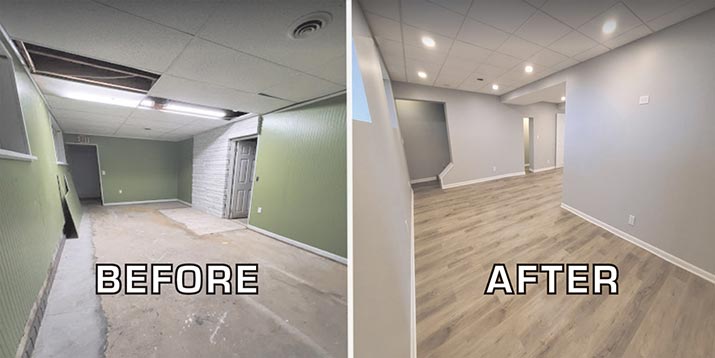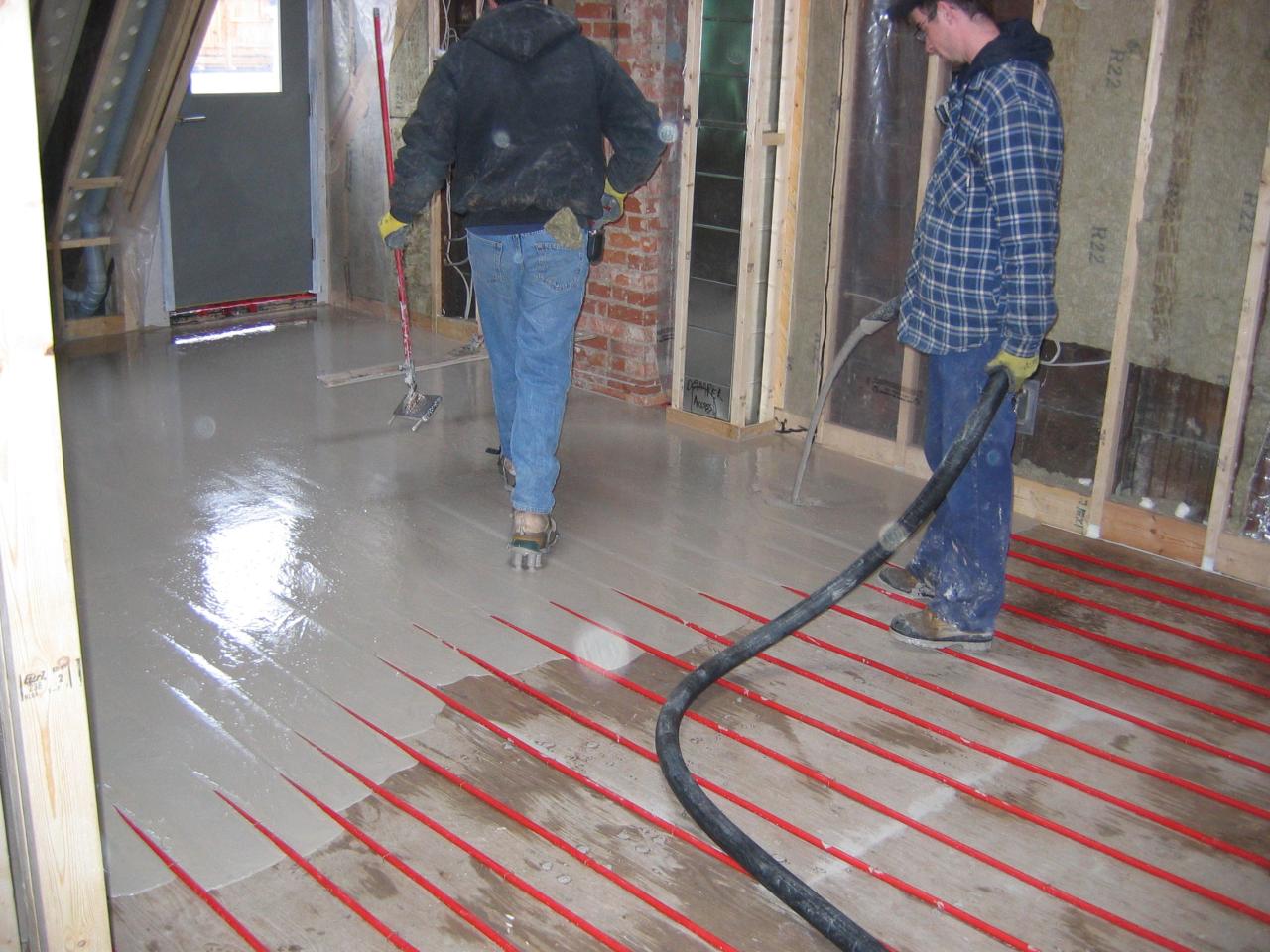Basement Finishing Contractor Your Guide to a Perfect Remodel
Basement finishing contractor services are becoming increasingly popular as homeowners seek to maximize living space and add value to their properties. This comprehensive guide will walk you through the crucial steps of selecting a reliable contractor, planning your project effectively, and managing your budget to ensure a successful and enjoyable basement transformation.
We’ll explore the various types of basement finishing projects, from basic drywall and flooring to more complex electrical and plumbing installations. You’ll learn how to choose the right contractor, considering their experience, reviews, and pricing. The guide will also Artikel essential project planning elements, including checklists, detailed budget examples, and cost-saving strategies.
Basement Finishing Services: Basement Finishing Contractor
Transforming your basement into a functional and inviting space requires careful planning and execution. A well-executed basement finishing project can significantly increase the value and livability of your home. This section details common projects, the steps involved, and the essential considerations for a successful remodel.
Common Basement Finishing Projects
Basement finishing projects encompass a wide range of improvements. These typically involve a combination of tasks, from simple cosmetic enhancements to more complex structural modifications. Common projects include:
- Drywall Installation: This is a fundamental step for creating smooth, even walls, essential for achieving a finished look and facilitating the installation of other fixtures. Proper drywall installation involves careful measuring, cutting, and hanging, ensuring structural integrity and aesthetic appeal.
- Flooring Installation: Basement flooring options are diverse, ranging from durable tile to plush carpeting. The choice depends on the desired aesthetic, budget, and level of moisture control required. Proper subfloor preparation is critical to prevent future problems.
- Electrical Work: Adding new electrical outlets, lighting fixtures or upgrading existing systems requires careful planning and adherence to safety codes. This is crucial for both functionality and safety within the basement environment.
- Plumbing Installations: Installing new bathrooms, laundry rooms, adding additional plumbing fixtures needs precise planning and execution. This ensures proper water supply, drainage, and sanitation within the finished space.
Steps in a Typical Basement Remodel Project
A well-managed basement remodel project follows a structured approach from initial consultation to completion.
- Initial Consultation: This involves a meeting with a contractor to discuss project scope, budget, desired aesthetics, and timelines. This is the critical first step for defining the project’s parameters.
- Design and Planning: A comprehensive design plan is crucial for the project’s success. This involves creating blueprints, selecting materials, and outlining the project’s timeline.
- Permitting and Approvals: Depending on the project’s scope, necessary permits and approvals from local authorities may be required. This step ensures compliance with building codes.
- Construction and Installation: This phase involves the actual execution of the project, including drywall installation, flooring, electrical work, plumbing, and finishing touches.
- Final Inspection and Completion: The project is finalized after a thorough inspection by the appropriate authorities. This step ensures compliance with building codes and quality standards.
Basement Finishing Styles
Different basement finishing styles cater to various tastes and preferences. The choice of style influences the selection of materials and overall aesthetic.
| Style | Flooring | Walls | Ceiling | Lighting |
|---|---|---|---|---|
| Rustic | Engineered hardwood, stone, or tile | Drywall, stone veneer, or exposed brick | Wood beams, drywall, or exposed concrete | Recessed lighting, pendant lights, or Edison bulbs |
| Modern | Laminate, tile, or vinyl plank | Drywall, painted, or wallpaper | Drywall or painted concrete | Recessed lighting, track lighting, or LED strips |
| Contemporary | Luxury vinyl plank, hardwood, or concrete | Drywall, painted, or wallpaper | Drywall, painted, or exposed concrete | Recessed lighting, ambient lighting, or accent lighting |
Ventilation and Insulation
Proper ventilation and insulation are vital for a comfortable and healthy basement environment.
- Ventilation: Adequate ventilation helps regulate moisture levels, preventing mold and mildew growth. This includes exhaust fans and strategically placed vents.
- Insulation: Proper insulation helps to maintain a consistent temperature, reducing energy costs and creating a more comfortable living space. This includes applying insulation to walls, floors, and ceilings.
Basement Waterproofing Options
Basement waterproofing is essential to protect the space from water damage. Various methods are available, ranging from simple to complex.
- Exterior Waterproofing: This involves waterproofing the exterior foundation to prevent water from entering the basement.
- Interior Waterproofing: This involves installing a vapor barrier, drainage systems, or other measures to prevent water from accumulating inside the basement.
Contractor Selection and Evaluation

Source: fitchconstruction.com
Choosing the right basement finishing contractor is crucial for a successful project. A poorly selected contractor can lead to costly mistakes, delays, and a final product that doesn’t meet expectations. Careful evaluation and due diligence are key to ensuring a positive experience and a high-quality finished space.
Criteria for Selecting a Reliable Contractor
Selecting a reliable contractor involves assessing several key criteria. These include experience, reputation, licensing, insurance, and references. A contractor with a proven track record of completing similar projects is a strong indicator of their competence and ability to handle your specific needs. Their licensing and insurance are essential safeguards, ensuring legal compliance and financial protection in case of unforeseen circumstances. Finally, positive reviews and testimonials from previous clients can offer valuable insights into their work ethic and quality of service.
Questions to Ask Potential Contractors
Thorough questioning is vital during the selection process. A detailed understanding of a contractor’s approach, experience, and potential challenges is paramount. This ensures the chosen contractor aligns with your project goals and expectations. A list of pertinent questions includes:
- What is your company’s experience in basement finishing projects, specifically focusing on projects similar in scope and complexity to mine?
- Can you provide examples of previous projects and client testimonials?
- What are your licensing and insurance details? This ensures legal compliance and liability protection.
- What is your typical project timeline, and how do you manage potential delays?
- How do you handle unexpected issues or changes in the project scope?
- What is your payment schedule and procedure? What are your terms of service?
- Can you provide references from satisfied clients for direct contact?
Contractor Comparison Table
A comparison table can help evaluate potential contractors. This allows for a side-by-side assessment of experience, reviews, pricing, and references.
| Contractor | Experience (Years) | Reviews (Average Rating) | Pricing (per square foot) | References |
|---|---|---|---|---|
| Basement Solutions | 15 | 4.8 | $50 | Available upon request |
| Elite Finishing | 10 | 4.5 | $45 | Available upon request |
| Pro Basement Builders | 8 | 4.7 | $55 | Available upon request |
Importance of Multiple Quotes and Contracts
Seeking multiple quotes from different contractors is essential for making an informed decision. This allows for a comparative analysis of pricing, scope of work, and potential project timelines. Obtaining multiple contracts ensures you understand the terms and conditions Artikeld by each contractor and ensures the chosen contract aligns with your expectations. It’s crucial to review each contract meticulously, paying attention to details like payment schedules, warranties, and dispute resolution procedures.
Common Red Flags
Recognizing red flags is crucial in preventing potential issues. Unrealistic promises, lack of transparency, and reluctance to provide references should raise concerns. Contractors who avoid discussing specific details or provide vague answers should be viewed with suspicion. Be wary of contractors who offer extremely low or excessively high prices compared to the market average, as these could indicate potential problems.
Project Planning and Budget

Source: renossanceinc.com
Planning a basement finishing project requires careful consideration of various factors to ensure a successful and cost-effective outcome. A well-defined plan, realistic budget, and understanding of potential challenges are crucial for a smooth execution. This section details the key aspects of project planning and budgeting, including checklists, examples, and cost-saving strategies.
Project Planning Checklist
A comprehensive checklist streamlines the planning process, ensuring that all essential steps are addressed. This approach prevents overlooking critical details and promotes a more organized and efficient project execution.
- Site Assessment and Design: Measure the basement’s dimensions, identify existing structural elements, and assess the potential for future modifications. Consider the desired layout and functionality of the finished space. Include a thorough inspection for any potential issues, like water damage or structural problems.
- Permitting and Regulations: Researched and complied with local building codes and regulations for basement finishing projects. Obtain necessary permits and approvals before initiating any construction work. This step ensures legal compliance and avoids potential delays or fines.
- Material Selection and Sourcing: Choose suitable materials based on the project’s budget and desired aesthetic. Compare prices from various suppliers to identify cost-effective options without compromising quality. Consider the durability, longevity, and environmental impact of the materials.
- Contractor Selection and Evaluation: Select a qualified and reputable contractor based on their experience, references, and pricing. Evaluate different contractors and their proposed work, focusing on their understanding of the project scope and budget.
- Budgeting and Timeline: Develop a detailed budget that includes labor, materials, permits, and contingency funds. Establish a realistic timeline for each stage of the project, accounting for potential delays. Set specific deadlines for each stage to ensure the project remains on track.
- Project Management: Establish clear communication channels with the contractor and all stakeholders. Track progress, manage changes, and address potential issues proactively to ensure timely completion of the project.
Budget Example for a Typical Basement Finishing Project, Basement Finishing Contractor
A typical 1000 square foot basement finishing project, converting it into a recreational area, could have a budget breakdown like this:
| Category | Estimated Cost |
|---|---|
| Labor (e.g., drywall, flooring, electrical, plumbing) | $15,000 – $25,000 |
| Materials (e.g., drywall, flooring, insulation, fixtures) | $8,000 – $12,000 |
| Permits and Inspections | $500 – $1,000 |
| Contingency Fund | $1,000 – $2,000 |
| Total Estimated Project Cost | $25,000 – $40,000 |
Note: This is a general estimate and actual costs may vary based on specific choices, location, and contractor fees.
Factors Affecting Basement Finishing Costs
Several factors influence the total cost of a basement finishing project.
- Size of the Basement: Larger basements generally result in higher material and labor costs. The greater the square footage, the more materials are needed, and the more time is required for the work.
- Complexity of the Project: Projects with extensive features (e.g., custom cabinetry, wet bars, or high-end finishes) increase the complexity and labor cost.
- Materials Used: High-end materials like hardwood floors, custom tile work, or premium fixtures add significantly to the project cost.
- Location: Labor costs and material prices can vary considerably depending on the region or city. Local economic conditions will impact the cost of materials and labor.
Cost-Saving Strategies
Several strategies can help reduce project costs without compromising quality.
- Selecting Affordable Materials: Consider using alternative materials that offer comparable quality at a lower cost, such as laminate flooring or vinyl plank flooring instead of hardwood.
- Negotiating with Contractors: Discuss pricing and payment terms with contractors to potentially achieve lower rates.
- DIY Projects: Some tasks, like painting or basic drywall work, can be undertaken by the homeowner, reducing labor costs.
- Prioritizing Essential Features: Focus on the core functionality and desired features without overspending on unnecessary extras.
Estimating Project Duration
The duration of a basement finishing project depends on various factors.
- Project Scope: Larger and more complex projects generally take longer to complete.
- Contractor’s Schedule: The contractor’s availability and workload influence the project timeline.
- Permitting and Inspections: Delays in obtaining permits or conducting inspections can affect the overall project duration.
- Material Availability: Unforeseen delays in material delivery can extend the project timeline.
- Unexpected Issues: Unforeseen structural or other issues can impact the project timeline and budget.
Final Conclusion
In conclusion, this guide provides a roadmap for successfully navigating the basement finishing process. By understanding the services offered by basement finishing contractors, evaluating potential contractors carefully, and meticulously planning your project, you can confidently embark on your basement renovation. Remember to prioritize a detailed budget, realistic timelines, and open communication with your chosen contractor for a seamless and rewarding experience. A well-executed basement finishing project can significantly enhance your home’s functionality and appeal, making it a worthwhile investment.





